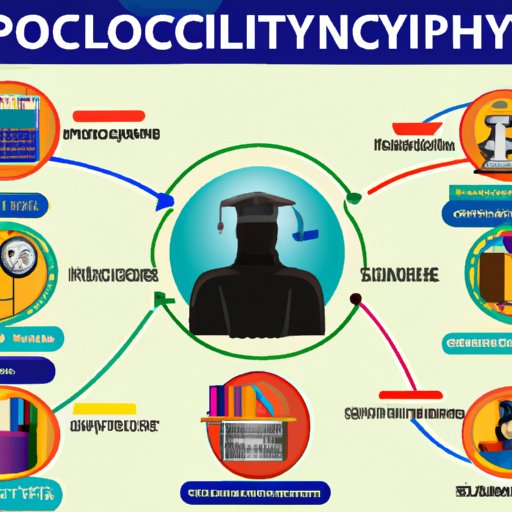Introduction
Becoming a psychologist is a lengthy process that requires dedication and hard work. It involves completing a number of academic and professional steps, including obtaining an undergraduate degree, a graduate degree, and licensure. The amount of years it takes to become a psychologist varies depending on the individual and their chosen career path. This article will explore the educational requirements and timeline of becoming a psychologist.

Exploring the Educational Requirements for Becoming a Psychologist
The first step in becoming a psychologist is obtaining an undergraduate degree in psychology or a related field. Depending on the university, this can take approximately four years to complete. During this time, students should focus on gaining knowledge of psychological theories and research methods by taking courses such as social psychology, abnormal psychology, and cognitive neuroscience.
In addition to an undergraduate degree, aspiring psychologists typically pursue a graduate degree in psychology. According to the American Psychological Association (APA), most states require a doctoral degree in order to become a licensed psychologist. Common doctoral degrees include a Doctor of Psychology (PsyD) or a Doctor of Philosophy (PhD). A PsyD is typically more focused on clinical practice, while a PhD is more research-oriented. Both degrees usually take 4 to 7 years to complete.
Breaking Down the Timeline of Becoming a Licensed Psychologist
Once an individual has completed their graduate degree, they must complete a few additional steps in order to become a licensed psychologist. These steps typically include supervised professional experience, an ethics exam, and a licensing exam. Depending on the state, these steps can take anywhere from 1 to 3 years to complete.
In order to obtain supervised professional experience, individuals must work under the supervision of an experienced psychologist. This may involve working in a clinic, hospital, or other health care setting. The amount of hours required varies depending on the state, but typically ranges from 1,500 to 3,000 hours. Additionally, individuals must also pass an ethics exam and a licensing exam before they can be fully licensed.
The Average Number of Years it Takes to Become a Psychologist
The average number of years it takes to become a psychologist depends on a variety of factors, including the type of degree pursued, the length of the supervised professional experience, and the amount of time spent studying for exams. Generally speaking, it can take anywhere from 6 to 12 years to become a licensed psychologist. However, some individuals may take longer or shorter depending on their specific circumstances.
For example, an individual who pursues a PsyD program and completes their supervised professional experience in two years may become a licensed psychologist in six years. On the other hand, an individual who pursues a PhD program and takes three years to complete their supervised professional experience may become a licensed psychologist in nine years.

Examining the Different Career Paths to Becoming a Psychologist
In addition to traditional career paths, there are a number of alternative paths to becoming a psychologist. These include pursuing a master’s degree in psychology, enrolling in an accelerated PsyD program, or completing a postdoctoral fellowship. Each of these paths can significantly reduce the amount of time it takes to become a psychologist.
For instance, an individual who pursues a master’s degree in psychology can become a licensed psychologist in as little as four years. Similarly, an individual who enrolls in an accelerated PsyD program can become a licensed psychologist in five years. Finally, an individual who completes a postdoctoral fellowship can become a licensed psychologist in six years.

Assessing the Benefits of a Longer Education for Psychologists
While a longer education may seem like a daunting prospect, there are numerous benefits to obtaining additional degrees and certifications. For example, having additional qualifications may make an individual more competitive in the job market and provide them with additional career opportunities. Additionally, having a wider breadth of knowledge can help individuals provide better care for their clients.
A study by the National Center for Biotechnology Information found that “psychologists with higher levels of education reported greater professional satisfaction, fewer malpractice claims, and higher income than those with lesser levels of education.” This suggests that having a longer education can have positive benefits for psychologists.
Conclusion
Becoming a psychologist is a lengthy process that requires dedication and hard work. It typically takes between 6 and 12 years to become a licensed psychologist, though this can vary depending on the individual’s chosen career path. There are a number of different paths to becoming a psychologist, such as pursuing a master’s degree or enrolling in an accelerated PsyD program. Additionally, having a longer education can provide numerous benefits for psychologists, such as increased professional satisfaction and higher income.
For those considering a career as a psychologist, it is important to remember that the journey to becoming a licensed psychologist can be long and challenging. However, with dedication and perseverance, it can also be incredibly rewarding.
(Note: Is this article not meeting your expectations? Do you have knowledge or insights to share? Unlock new opportunities and expand your reach by joining our authors team. Click Registration to join us and share your expertise with our readers.)
